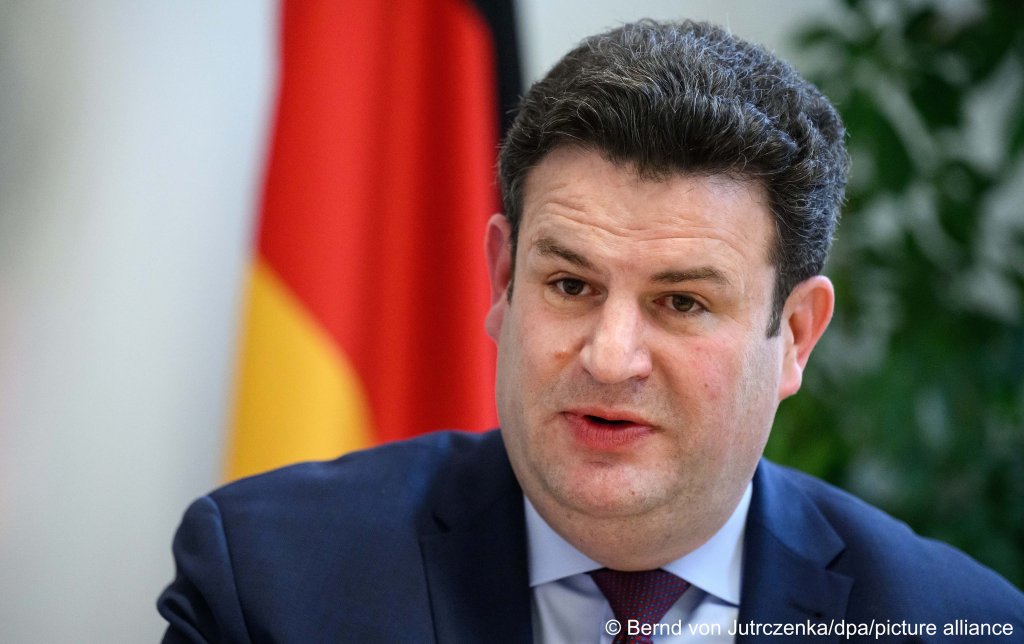Germany’s "Opportunity" or "Chancenkarte" was launched this week. The card is a residence permit that allows workers from third countries to enter Germany in order to seek employment.
Germany’s new "Chancenkarte" or "Opportunity Card" was launched on June 1. It provides a points-based system for skilled workers from non-EU countries to enter Germany in order to seek employment.
According to the German foreign office, it will also seek to streamline the recognition of foreign professional qualifications in Germany.
Also watch: Can Germany's new 'green card' deliver?
The card represents the third and final part of Germany’s new skilled worker migration policy to enter into force. German Employment Minister Hubertus Heil has estimated that by 2035, Germany will need to replace at least seven million people in its employment market due to retirement.
The biggest shortages are currently showing up in the care and hospitality sectors. IT is another sector that is actively looking for new employees.
Application online or in person
You can apply for an Opportunity Card online via this Consular Services portal, or locally at a German embassy or consulate in your country. You cannot apply if you are already in Germany.
If you go online, you can use the handy points calculator to find out how many points you will receive for the qualifications you hold and the knowledge you have. You will also potentially speed up the application process, as you will be able to file your documents to the consular services online. You will still need to show your passport when you are called for a follow-up consular appointment.

Also watch: Kenyan bus drivers boost Germany's labor force via migration deal
The cards will be issued for a period of up to one year. If you then find qualified employment during your stay, you may obtain a residence permit to continue working in Germany.
According to the information page from the German government, available in English and German, this is how the points system works:
You will need to be able to acquire a minimum of six points from the following categories to apply for the card.
Education and Training
4 points – if you have gone through the procedure to recognize your foreign educational qualification and "partial equivalence" has been established.
You will also receive four points if you are qualified in a regulated profession where you need special measures or a license to practise.

Qualifications in a 'shortage occupation'
1 point – If your qualification falls into a designated "shortage occupation", including:
- manufacturing, mining, construction and distribution managers
- information and communications technology service managers
- or professional services managers, which includes childcare service managers and health service managers, elderly care services managers, social welfare managers, education managers, financial and insurance services managers, professional services managers not elsewhere classified)
- science and engineering professionals, (including mathematicians, actuaries and statisticians, life science professionals, engineering professionals, electrotechnology engineers and architects, planners, surveyors and designers
- medical doctors; nursing and midwifery professionals
- vets
- other health professionals
- teaching professionals
- information and communications technology professionals, which includes system analysts, software developers, web and multimedia developers, applications programmers, database designers and administrators, systems administrators, and computer network professionals.
Professional experience
2–3 points – if you can prove at least two years' professional experience appropriate to your qualifications that you acquired within the last five years, you will receive two points. If you can prove at least three years of professional experience within the last seven years you will receive three points.
Language skills
1–4 points – You will receive one point if your German language skills are up to an A2 standard measured by the Common European Framework of Reference for languages (CEFR).
Two points if your language level is at B1 and three points for B2 or higher.
If you have English language skills at level C1 or higher and at native speaker level, then you will receive an additional point.
Also read: What do Germany's migration partnerships entail?
Age
1–2 points – People younger than 35 will receive two points. One point will be awarded if you are between 35 and 40.

Time already spent in Germany
1 point – If you have resided legally and continuously in Germany for at least six months in the last five years. This includes stays for study, language acquisition or gainful employment, but not holidays or leisure time.
Joint applications
1 point – If you want to enter Germany with your spouse or registered partner, and you both apply for an Opportunity Card at the same German mission, then one extra point will be awarded for one of the two applications, provided the other requirements are also fulfilled.
Additional information
When you apply for the Opportunity Card, you will need to provide proof that your professional qualification is recognized by the state either in Germany or in the country where it was obtained.
You also need to provide proof that you can support yourself during your stay in Germany. Generally you need to prove you will have at least 1,027 euros per month.
Also read: What's changing in Germany's immigration policy in 2024?
While you are looking for a job, you have the opportunity to work for up to 20 hours a week in a part-time job. You can also try out for jobs for up to two weeks at a time to familiarize yourself with potential types of work.
According to the German press agency dpa, there will be some circumstances in which the German government will extend the Opportunity Card by an extra year.
West Balkan regulations
On the same day as the Opportunity Card entered into force, new regulations regarding unskilled workers from West Balkan states also entered into force.

For citizens of Albania, Bosnia and Herzegovina, Kosovo, North Macedonia, Montenegro and Serbia, even unskilled workers have more of a chance of entering Germany to work if they can prove they already have a job contract lined up.
Also read: European Commission launches online platform to attract skilled labor
Up to 25,000 people per year will be allowed in via this route, according to Germany’s Federal Employment Agency (Bundesagentur für Arbeit). The agency expects to double this number, to 50,000 in the next year.
With dpa, EPD
